#jk rowling is a terrible writer series by isalise
Text
A Deep Dive into JKR's Terrible, Amateur Writing - Reflective Interlude
Hello and welcome to my ballsy series where I will prove to you, dear reader, that J.K. Rowling, author of the Harry Potter series and resident Twitter TERF, is actually a very, very poor writer.
And when I say ‘poor writer,’ I’m talking about her prose, her sentence structure, and her scenes in the Harry Potter series. I am not going to discuss anything about the HP world nor the overall plot of the books.
This is all about the nitty gritty in the craft of writing itself.
Part One Link.
Part Two Link.
However…
Hiya! *waves* I’m Isa, the author of this… Actually, I dunno what to call this series anymore. Anyway, thus far, you’ve heard a very satirical tone from me in the previous two posts, but that’s not my normal tone. I’m a rather laid back kind of gal with a side of sarcasm and deluge of emoji usage.
I have used quite a confident, even bombastically obnoxious tone in the effort to be entertaining and engaging with these posts. It was meant to be playful and sarcastic. It’s the internet, so I’m aware everyone’s attention is… kind of like a commodity, unfortunately. Look at TikTok or YouTube. How long does a 30s video hold your attention before you’re scrolling to the next? It depends for me, I’ll admit. People don’t have the attention span for long style posts such as these and that’s fair. Sometimes, I don’t either.
Thus, I used repeated ‘catch phases’ to maintain a rhythm and a thematic style through the series with a controversial title meant to hook a reader. I repeat the opening, even in this post. I repeat ‘Class is in session’ to show the beginning of the major section of the post.
However, in this interlude, I’ve toned it all down because I wanted to give you a window into my heart, my purpose, and my intent in this series. It is a reflective post that ends with writing motivation to you, my dear reader, as well as links to writerly resources.
I’ve had a lot to think about this week and I realized that many writers (and other creatives) have to battle against an enemy found within themselves. This enemy often torments many with cruel, destructive thoughts; they burrow their way into so many writers’ minds. It whispers: “Can you really do this? Are you really sure you’re any good? Aren’t you just fooling yourself? They’re going to find out you’re just a fraud. So… why bother?”
Whose voice is that?
Let’s talk about the destroyer of creation, Imposter Syndrome, why I refuse to let the bastard infect me anymore, and why my confident tone in previous posts has grated nerves.
Remember: take what resonates and leave what doesn’t.
(This means I write my posts with the honest acceptance and expectation that not everything will fit with your style, your vibes, or your personality. That’s okay.)
All right, let’s buckle up, my dear writing friends. Grab a snack. Hydrate. Let’s begin. And yes…
Class is in session on this little Tumblr post… should you wish to attend.
Having confidence or pride in one’s work seems to be taboo. Any brief moment in time where I tried to be proud about my writing or say, Hey, I’m a good writer, I was always told to be humble. “Don’t be prideful. Be humble.” It would often chip away at my self esteem. I could be a good writer, but I couldn’t allow myself to feel like a good writer.
But no more.
I have only given myself permission to be confident about my writing within the past month. This is why I started this series in the first place. I wanted to share knowledge and in an entertaining way. I make a bold claim that I’m a better writer than JKR; I analyze her writing to both improve my own understanding and to help others as well.
However, this does not mean I’ve ever been under the delusion I’m perfect. Absolutely not. God, that’s so fucking laughable! I am not perfect. I am not a perfect writer. I definitely don’t know everything. Someone once corrected me, informing me that snakes are venomous, not poisonous. Bless them, wasn’t aware of that. Immediately fixed that. One of the recent reblogs said geodes do not contain emeralds. God bless, I didn’t know that, though in the case of how it was used in TBG, I won’t be changing it since it’s within a character thought.
Sorry, Tom. I guess you need to take a geology class, too.
Ugh, and I have so many godforsaken typos. My soul withers when I catch a typo after I’ve posted a chapter. I miss things all the time. I repeat things because ‘that’s my thing’ and I don’t always catch them in my edits. I forget things all the time. Thank GOD for Dede, someone who loved TBG so much she spent countless hours archiving data from it, where she caught a number of inconsistencies and alerted me to them. I still haven’t been able to fix them yet, but I’m so grateful to her. I’ve noted them all down. Harry’s height often is incorrectly implied to be taller than it should be because my brain isn’t wired for imagery. My brain forgets TBG Harry is a short king at 5’4” while TBG Tom is 6’2” and I need to go back to fix all of those.
I am not a perfect writer and I don’t claim to be.
My goals with this series are to study/learn for myself, teach/share knowledge with others, and learn some more from this experience. I love this kind of analysis. But there’s difference between my analysis of JKR’s writing and a number of those who have retaliated with an analysis of my writing.
Instead of looking at my imperfections with the desire to learn from them, they were illuminated in the attempt to ‘take me down a notch.’ To those who put in the effort to make counterpoints, I do thank you for your contribution to this series. It is appreciated, even when given impolitely and with the intent to ‘put me in my place.’
Despite all of my errors and imperfections, I still stand by my statement: I am a better writer than J.K. Rowling.
Do you know who else is a better writer than her? I could list thousands of them. They’re fanfiction writers. They’re indie authors. They’re other traditional published authors. They are so many other writers that, yes, I do think are stronger writers than JKR.
And you’re a better writer, too, so long as you wish it.
I sincerely want you to believe that.
Why? Because it’s clear within the Harry Potter series that JKR did not make attempts to grow as a writer. She just wrote. Perhaps she was under deadlines, but the lack of editing is pretty apparent to me. When you write a lot, you will inevitably get more skilled over time, but you have to actively be seeking improvement to see drastic change in your own skill. It is this lack of drive that I see within her work. She’s not making attempts to push the boundaries of her abilities and skills with each new book.
I’m not at the end of my journey of learning. I never will be. I love expanding my skills. I’m even learning during the process of writing these posts, too. I’m seeing more weaknesses in my own work and I’m now thinking on ways to strengthen my writing even further.
That’s the point of this series.
In the end, it’s not really about me. No, really, it’s not about me. I truly think it’s about the jealousy of seeing another writer be confident in their work. You see, I’m not supposed to be confident; I’m not supposed to act like I can help and teach others to write. How dare I. Posting anything about my work is an act of attention seeking. I’m supposed to be ‘humble.’ I’m supposed to be silent. I’m supposed to wave a shy, dismissive hand at compliments.
Why?
Why is being proud of one’s work and loving one’s own work such a controversial idea?
Imposter Syndrome often cripples creators. There’s already so much self doubt and anxiety in the world, but Imposter Syndrome can really wreck with a creator’s mind. It’s a poison. It stops you from creating what you love most. When you believe you aren’t good enough, then it becomes harder to try. Your belief becomes truth to you, whether or not it was true in reality in the first place. Perhaps, you sink into depression. You become anxious about sharing anything, for fear anyone might say even the slightest negative comment. The heart becomes fragile and brittle, and the muscle which builds skill atrophies over time. You see your work through a lens of self hate. You can only see flaws.
“I will never be good enough.”
When you’re in this state of mind, it’s hard to see the truth about your work.
But let me promise you something: your writing is far more beautiful than you realize.
In spirit, all creative writing is perfect to me with all of its typos and mistakes (yes, even all of the Harry Potter books!), but no single work is objectively perfect. There will always be room to improve your creation because you’re constantly growing. It’s why so many aspiring novelists fall into an endless cycle of editing their first few chapters. The more they write, the more they improve; thus, when they go back to their earlier chapters, they get stuck trying to update those chapters instead of pushing forward to the finish line.
Your work is valuable, no matter what. It’s beautiful. You’re allowed to love your work. You’re allowed to see the good in it and you’re allowed to have confidence in yourself. You’re allowed to say to yourself and to others, I’m a damn good writer.
You deserve to have love, for yourself and for your art.
I have often sincerely complimented other writers and, many times, after they respond with their thanks, it becomes clear to me they’re not confident in their work, yet they have still bravely shared it with us.
I’m so proud of them. Thank you for your bravery.
My heart breaks for them, too. They’re such good writers—such damn good writers. And I wish they knew and believed this.
I will always do everything in my power to encourage others.
How do you feel about your writing? Do you like your writing? You should. You really should because it is good. You created it, after all. There will always be space to grow and refine your craft, of course, but you are a good writer now. You’re going to be a better writer tomorrow and the next day, so long as you desire this growth in yourself. There’s no destination, though. There’s no magic level you have to reach before you’re allowed to have some confidence in yourself and your abilities. The only trap to avoid is remaining stagnant. Writing is a skill. Writing is a craft. This means it gets better through study and practice.
You can achieve that.
I know it’s hard, though. There are so many naysayers in life. There are so many people waiting to attack and bring others down, both on the internet and in our own families. How many precious fanfics have been lost because a writer received horrible, hateful comments? How many writers have disappeared from the internet because of this cruelty? We have lost many in all fandoms. That is unacceptable to me.
Uplift others. Spread love, not hate.
You’re allowed to be proud about your work, imperfect as it may be. Please, I beg you, don’t let the negative voices of others—including your own!—drag you down and steal the joy of creating. I know it’s so very, very hard to stand strong against such voices. Words have power, but you have more. Resist the naysayers.
What you have to offer the world is precious. Please lift your head and acknowledge that what you create is good. It’s great. It’s amazing. It’s fucking fantastic. You’re not an imposter nor a fraud. No one can offer what you can to the world. No one can write the stories you have in your head the way you can. Your style is unique to you. You’re allowed to love it as it is now and you’re allowed to love it whatever form it takes in the future.
Imposter Syndrome is a thief; toss it into jail and throw away the key.
My writing is not perfect and it never will be, but I’m a better writer today than I was ten years ago. I’m a seeker of my own growth. I’m often reading books on writing and watching YouTube videos on writing. I absorb it all because writing is my truest love and passion. My style has evolved from reading endless amount of novels and fanfics. I devour both.
But I wasted a decade thinking I didn’t have what it takes.
And life is short. I can’t waste anymore time.
Don’t be like past Isa, please.
There’s a difference in refinement between an episodic fanfic posted over the course of years and a traditional novel published in whole, but I still stand by my work. I recognize my style will not be enjoyed by all those who read it. It’s okay if you don’t like my style. I’m eternally grateful for the many readers who do love my writing. I’m humbled and honored by the sheer volume of people who have commented, bookmarked, and have left kudos on my work. Thank you.
My style has evolved into what it is today due to a combination of two things.
I have ADHD. It’s why my style uses smaller paragraphs as a whole.
I have aphantasia. I lack a mind that can visualize pictures. I literally cannot see anything in my mind. When people say, “I can picture it in my mind,” that’s not me. I cannot at all. When there’s a lack of description in prose, it feels blank and empty to me. This is why I use vivid descriptions in the way I do because otherwise I feel nothing from my work.
It’s okay if this style doesn’t work for you. I love my style because it caters to what I need. I also love other styles that don’t use as much description; however, I can’t always follow what’s happening because of the wiring of my brain. I can get lost sometimes, but I still appreciate their style because I can’t effectively do what they can.
If you find no value in my style and what I offer in this series here, then that’s okay. I’m not offended. This series is for those who benefit from it. For you, there are so many other writers out there from whom you can learn and I’m more than happy to send you in the direction that benefits you the most.
Here’s a list of YouTubers you might find interesting.
ShaelinWrites has been working on many unpublished projects through the years and has lots of great discussion videos on writing.
Abbie Emmons is a self published author with solid writing advice in all of her videos.
Alexa Donne is a traditionally published author with great insider information into the traditional publishing world.
Ellen Brock is a professional editor. She knows her stuff.
I hesitantly suggest Jenna Moreci and her content on YouTube because I think she has some major weaknesses in her writing. Many others have seen this about her books. However, she is a successful indie author and her YouTube content has a lot of value.
Brandon Sanderson has an entire college course in a playlist on his channel. It’s a fabulous free resource if you vibe with his style of writing. Highly recommend.
Here’s a list of writing books I recommend.
Elements of Fiction Writing, a five book series. My TOP recommendation is Elements of Fiction Writing - Beginnings, Middles & Ends.
Sin and Syntax: How to Craft Wicked Good Prose
Let the Crazy Child Write!: Finding Your Creative Writing Voice
Novelist's Essential Guide to Crafting Scenes
All right then.
Thank you for sticking around. I hope you accept this post in the good faith it was given and was always given in the previous posts. Next post, I’ll be returning to my playful satirical tone. Hehe~!
Please do the world the greatest of favors and write. Create. Share your fanfiction. Become best selling authors, traditional or indie. I promise you’re far more capable and skilled than you realize.
Until next time.
Isa
#harry potter#hp#fanfiction#fanfic#hp fanfic#hp fanfiction#jk rowling#fuck jkr#anti jkr#jk rowling is a terrible writer series by isalise#on writing#writing#writers#writer#author#authors#writing advice#writing motivation#writing stuff#becoming better at writing#writing tips#writeblr#writing reflection#writers on tumblr#writers on ao3#writerscommunity#creative writing#JKR's Terrible Amateur Writing Series#writing help#writing resources
24 notes
·
View notes
Text
A Deep Dive into JKR's Terrible, Amateur Writing - Part One
Welcome to my new series, where I will prove to you, dear reader, that J.K. Rowling, author of the Harry Potter series and resident Twitter TERF, is actually a very, very poor writer.
And when I say 'poor writer,' I'm talking about her prose, her sentence structure, and her scenes. I am not going to discuss anything about the HP world nor the plots of the books.
This is all about the nitty gritty in the craft of writing itself.
Disclaimer for all readers: I'm going to sound very confident in my posts. I'm going to be working under the assumption that I'm a better writer than JKR. Because I am. My apologies if this rubs you the wrong way. You're just witnessing two and half decades of experience with the intensity from a neurodivergent who is hyperfocused on her special interest. I didn't just learn how to create stories; I learned the craft of writing to a minutia of details.
After years of being beaten down by others, I will no longer tolerate that.
I will be using my writing to compare with hers to make some of my points. Some of what I say in these posts could be considered stylistic choices. However, in my humble opinion, most of this is a difference of skill, which can be learned. Yes, everything I'm going to teach and cover in this series can be learned. There's no 'talent' here. You can learn how to become a better writer right here and now. You only have to understand the craft of writing and sentence structure to better improve your prose and scenes.
I don't have fame and money.
I don't need them to teach you how to write better than JKR.
You're free to disagree with my stances about this and about everything I cover, of course. But if you're a writer, you might gain some insight from this post and I sincerely hope you are enriched by my efforts in this. I spent quite a few hours on this post. Helping others become a better writer than JKR is one of the greatest contributions I can give to society.
Thus, take what resonates and leave what doesn't.
I have stated before: JKR's writing is bloated in the wrong places, underwritten in others, and the prose is poor. These problems show up in all of her HP books.
Buckle up, my writing friends. Grab a snack. Hydrate. Let's begin.
Class is in session.
In this post, we're going to dissect a page from HP4.
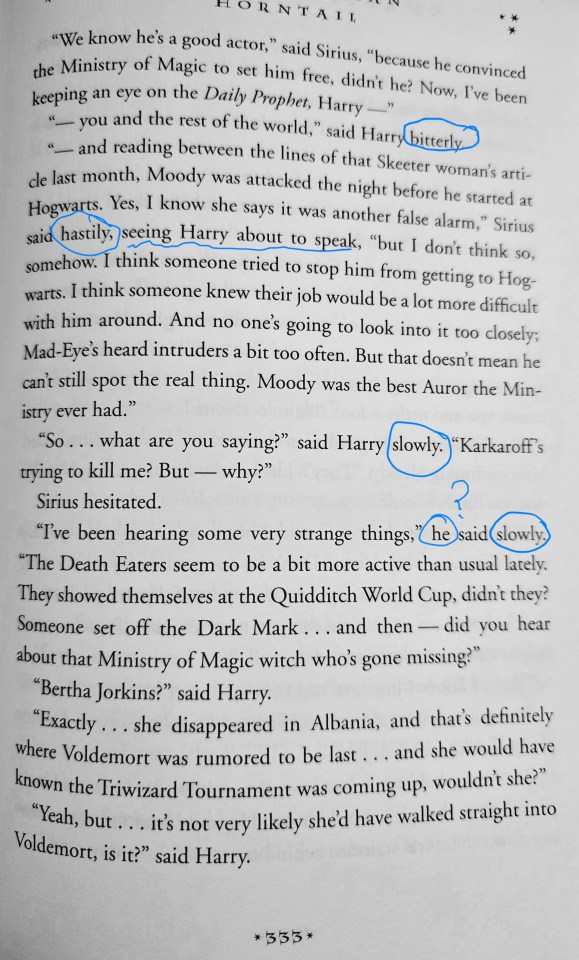
There's so much wrong with this page and the three pages of this scene overall. So much to go over. Bullet points I'll cover from this page:
Disconnected Dialogue Lines
The Great Sin of Adverbs
Too much fucking dialogue!
Wrong focus altogether in this scene
Out of POV writing
First point. This is a huge ongoing issue I see in all of the HP books. There are a lot of disconnected dialogue lines, which become confusing over time. This could be an issue of the publisher, but it's still a problem. In the middle of this page, we have:
Sirius hesitated.
"I've been hearing some very strange things," he said slowly.
Wait, wait, wait. Who said this? Listen, I know. I know it's Sirius. However, this is an improper placement on the page and can become confusing because Harry also goes by he/him pronouns and he's also in this scene. While the dialogue here suggests Sirius is talking, it could easily be misinterpreted if there were other characters or if he said something that Harry could've just as easily said.
To make this dialogue more clear for the reader, it should go as follows:
Sirius hesitated. "I've been hearing some very strange things," he said slowly.
Second point. JKR is an adverb sinner, a criminal. Jail. "Do not pass go; do not collect $200." Arrest her for these blatant crimes, please, for the love of god.
Look, I love adverbs. They're great. Don't fucking listen to anyone who outright demonizes them (including your huffy, uppity literature professors). Adverbs are the seasonings of writing. You season your food; you also need to season your writing when the case asks for it.
However...
Adverbs should always be used sparingly when connected to dialogue tags. The setting in this scene is: Harry is in the Gryffindor Common Room at night crouched in front of the fireplace where Sirius is in the fire in a floo call. I read through the whole scene, though I've only shown one page here.
Harry says a line of dialogue 'slowly' three times and Sirius says a line of dialogue 'slowly' two times.
The same adverb 'slowly' is used FIVE FUCKING TIMES IN THREE PAGES.
I want to scream, not gonna lie here. Set this adverb on fire!
What does this adverb do for us in this conversation? What is so important that we have to be told that five lines of dialogue were said slowly? What do they contribute? Spoiler alert: nothing. What are their facial expressions? Harry is 14. He's exhausted since it's well after 1am or so and he's burdened with the new knowledge of dragons for the first task. He's kneeling in front of a very hot fireplace. There's fire fumes and smoke, potentially. Is he fidgeting? Is he yawning? Rubbing his eyes? Bouncing a leg? Is he picking at the carpet or rug?
Harry is a tired, burdened child.
Show me this!
Now I'm not saying that you can't use adverbs in your dialogue tags. There's a huge difference between "he said softly" and "he whispered." It's about balancing the moment when an adverb says just enough versus an adverb replacing well needed scene enrichment. Let's compare this with a section from my HP time travel fanfiction, Terrible, But Great, Chapter Thirty.
Dumbledore nodded at Monty, pocketing his wand. “Mr. Potter.”
“Lo, Professor,” said Monty, pout gone, but still a watchful light in his gaze.
“Is there a problem?” asked Dumbledore in a mild tone.
Ice slipped in between Tom’s ribs, piercing his flesh.
Monty tilted his head. “No, sir.”
Oh, but Tom knew better. He could see through that innocent facade. The man could’ve been a Slytherin for how much he was cataloguing every little detail, from Tom’s appearance, to the content of the selected books, and to the supplies of ink, quill, and parchment scattered on the surface of the table. Tom masked the raw, whirling feelings in his chest with a well practiced blank, emotionless expression. He willed himself to hide.
“Nothing at all, sir,” said Tom lightly. “Young Mr. Potter was regaling me about his friendship with Miss Malfoy.”
Monty glanced at Tom, brows furrowing.
Those blue eyes were piercing, filled with suspicion. “Was he now?” Dumbledore said; though his tone was still without direct accusation, Tom could hear the hint of it. “Then, may I ask, why a silencing charm was necessary for such a benign conversation?”
Tom wet his lips. His throat was dry. “I thought it wise to avoid disturbing others in the library.”
“I am awfully loud,” said Monty with a sage nod.
“Ah. A noble intent. However, it is not an appropriate use of magic in the library,” said Dumbledore, his gaze firm as it bore down on Tom. “Ten points from Slytherin. I think it’d be wise to take your studies to your common room, Mr. Riddle.”
“Yes, sir,” whispered Tom.
I only used "said Tom lightly" once in this section to show Tom attempting to be unaffected by Dumbledore's interference. I did not dialogue dump information in giant chunks. I did utilized actions tags versus adverbs, like Monty tilting his head or Tom licking his lips. I suspect that if JKR had written this scene, she'd have used lines like:
"No, sir," said Monty curiously.
or
"I thought it wise to avoid disturbing others in the library," said Tom nervously.
The adverbs that JKR's uses add nothing to her scenes. They're just thrown into them without a thought. Did she even reread this scene after she wrote it? I cringe in agony if I use an uncommon word more than three or four times in an entire 4,000 to 7,000 word chapter, let alone the same adverb five times in three pages. Good grief.
There are two other adverbs used in this page, hastily and bitterly. Hastily does nothing for the scene and is connected to another issue, but I'll go over that in the end. However, bitterly is one of the adverbs I'd keep. It gives us a glimpse into Harry's feelings here. We need more of this, but we got nothing.
Thus, the overuse of adverbs in JKR's dialogue detracts and steals so much from the scene.
Third point: there's too much dialogue and no description whatsoever. Again, the adverbs are a pathetic attempt to give us something, but they're thrown in there without a damn forethought. We're missing the crackle of the fire and the smell of it. We're missing Sirius' facial expressions. We're missing Harry moving around on the floor, fidgeting, yawning, rubbing his eyes, feeling the heat of the fire, bouncing his legs, picking at the rug, something, anything, etc.
The dialogue is bloated with a terribly boring conversation. It's just endless dialogue with nothing else. No, it's awful. Welcome to the fourth bullet point. This scene focuses on the entirely wrong point. This scene is 100% a plot device and it's terribly done as well. It's three pages about Karkaroff being a Death Eater--oh no he might be trying to kill you, Harry, aaaaaa--and something about Bertha Jorkins being near Voldemort's last location. Meh. Who cares. Somebody has been trying to kill Harry in every book thus far. This isn't a new development, sweetie.
We been done know this, okay? Come on.
This is a stilted, unnatural conversation between Harry and Sirius. It's not realistic. It's not normal. Telling Harry about the Karkaroff's past is boring and does nothing for him. One line, maybe two, for Sirius to say, "Hey, keep an eye out for Karkaroff. He's an old Death Eater." Done. End of Karkaroff information. And cut Bertha Jorkins out altogether. I'm sorry, but why the hell are we talking about a dead woman to a 14 year old kid whose biggest problem at the moment is dealing with a jealous friend, school ostracization, and a giant fire breathing lizard???
These points are important to the plot, but they're not important to Harry.
The plot isn't important. No, it's not.
Harry is the POV character.
Harry is the single most important aspect in every scene and should be treated as such.
The plot should weave around Harry, slowly revealing itself to both Harry and the reader. Harry should not be the weaver of the plot. He should not be used in plot devices.
Do you know what part of the conversation was summarized in the prose between Harry and Sirius in a single paragraph versus the three pages about Karkaroff?
Harry talking about how no one believes him about not putting his name in the Goblet of Fire. About the school hating him. About Ron, about his betrayal and his jealousy. About Rita Skeeter. About seeing the dragons as the first task. These are all important to Harry. These all are causing pain to Harry's heart right now. Somebody give this child a hug, please.
We missed out on exploring Harry's feelings here. The author skips the MOST important part of the conversation, what could've been a deeply emotional, either positive or negative, conversation between Harry and Sirius.
Oh, this scene could've been so good. It could've been amazing. There are so many paths that could've been explored here, too.
We could've had a callous Sirius, who doesn't notice Harry's state of being, and just goes on and on about nothing of importance where Harry clams up. Or we've could've had a comforting Sirius, who attempts to give Harry some actual advice about his friendship with Ron. We could've seen Harry opening up in his body language, connecting with this parental figure in his life. We could've heard a story of Sirius' time as a kid at school with Harry's father and the marauders.
We were robbed of an important moment between Harry and Sirius.
Instead, the author puts the focus on the red herring 'foreshadowing' of Karkaroff. What a waste. She's trying to put suspicion on him, rather than Moody/Barty Crouch Jr., the real Death Eater in disguise. Again, who cares. It's not about them. It's about Harry and how his experiences are affecting him. It's about how he reacts to them.
This scene is a waste of time and paper. It's empty of emotion and movement/flow. It's just there for a set up and it's glaringly obvious during a second read of the book.
When I say, "The writing is bloated and underwritten at the same time." this is what I mean. We're focusing on the wrong things here.
Fifth point. JKR breaks the POV character with the following line:
"--and reading between the lines of that Skeeter woman's article last month, Moody was attacked the night before he started at Hogwarts. Yes, I know she says it was another false alarm," Sirius said hastily, seeing Harry about to speak, "but...
Harry is the POV character. Sirius 'seeing Harry about to speak' should NOT be occurring in the prose whatsoever. To fix this with the bare minimum of effort for this poorly written dialogue line:
"--and reading between the lines of that Skeeter woman's article last month, Moody was attacked the night before he started at Hogwarts--" Harry opened his mouth to interject, but Sirius said hastily, "Yes, I know she says it was another false alarm, but..."
I wouldn't write these lines like this, by the way. I just don't want to rewrite this. It's a poor paragraph overall, but this is an example of returning the POV back to Harry. Sirius isn't 'seeing' anything anymore. Harry is doing an action and Sirius reacts to his action.
Breaking POV is a rule that can be occasionally broken, but should be done so with intent and purpose. I'm pretty confident when I say that JKR probably had no idea that this was a mistake on her part in the prose.
All right then.
We have come to an end of Part One in this series. We have dissected a single page and a single scene in JKR's Harry Potter and the Goblet of Fire. The page in question is 333 should you wish to look it up and study the scene yourself.
More to follow because I have lots of pages to go over. This will definitely be series, ah dear.
And so, please do the world the greatest of favors and write better than J.K. Rowling. I promise, it's not that hard once you see the differences.
Until next time.
Isa
#harry potter#hp#fanfiction#fanfic#hp fanfic#hp fanfiction#harry potter discourse#harry potter books#jk rowling#fuck jkr#anti jkr#jk rowling is a terrible writer series by isalise#on writing#writing#writers#writer#authors#author#writing advice#writing stuff#becoming better at writing#writer stuff#writeblr#writers on tumblr#writerscommunity#creative writing#JKR's Terrible Amateur Writing Series
301 notes
·
View notes
Text
A Deep Dive into JKR's Terrible, Amateur Writing - Part Two
Welcome to my ballsy series where I will prove to you, dear reader, that J.K. Rowling, author of the Harry Potter series and resident Twitter TERF, is actually a very, very poor writer.
And when I say ‘poor writer,’ I’m talking about her prose, her sentence structure, and her scenes. I am not going to discuss anything about the HP world nor the overall plot of the books.
This is all about the nitty gritty in the craft of writing itself.
Part One Link.
Disclaimer for all readers of this series:
I’m going to sound very confident in my posts where I work under the assumption I’m a better writer than JKR; because I am. My apologies if this rubs you the wrong way. You’re simply witnessing the culmination of over two and half decades of experience with the intensity from a neurodivergent who is hyperfocused on her special interest. I didn’t just learn how to create stories; I learned the craft of writing to a minutia of details.
I’m not a perfect writer. No one is. I’m not a talented writer either. I’m experienced and skilled through years of study and practice.
I don’t care about J.K. Rowling. At all.
If you’re triggered by the concept and fact that JKR is a terrible crafter of writing, then you might want to take a step back and self reflect on that personal issue.
I still very much love and adore Harry Potter; you’re still allowed to love Harry Potter.
This is not a series to bitch or bash. This isn’t a shitpost. This isn’t an attack on JKR, no matter the disgusting bullshit she spews forth on Twitter. However, my hope is people awaken to the fact that JKR isn’t the goddess of writing we’ve all been led to believe.
This is a place of study and learning, where the purpose is to help students gain critical thinking skills and writing analysis tools to become better in their craft.
And, sorry, one more disclaimer for this specific post:
Fanfiction is written for fun and is posted for free. I put most of my effort into my main fanfic, Terrible, But Great. (Yes, I intend to update Moon Rite soon, too) However, I also have two fanfics that are cowritten with another author; thus, the style of Shall I Stay and Badger Prey are understandably different. I spend three to four times the hours to edit a chapter versus drafting it. My process for fanfiction: I draft. I do one expansion edit. I do one proofread edit. I post.
However, if I were to publish a novel where people are expected to drop money on said book, my work flow would be vastly more extensive. To be clear, I’d do all of the following myself. I would not outsource. My process for published novels: I would draft. I would do three to four expansion edits. I would do two to three cutting edits. I would do three proofread edits.
See the difference?
Because I don’t go through a cutting edit for my fanfiction, I’ll often come back later and see things I think are weak. I’m constantly seeing where I can tighten my work. There’s always room for improvement.
Remember: Harry Potter and the Order of the Phoenix is a paperback book that costs $10. My fanfics are free. If I, someone who writes for free and puts what she considers the bare minimum of effort into them, have a higher standard in the quality of my writing than a paid traditionally published novelist, there’s a problem here.
All right, with that nonsense out of the way, buckle up, my writing friends. Grab a snack. Hydrate. Remember to take what resonates and leave what doesn’t. Let’s begin.
Class is in session.
In this post, we’re going to discuss these five pages from HP5 and dissect one paragraph and a line from page 731. All dialogue is highlighted in blue.
(My favorite book in the series, btw. I fucking love fifth year the most. JKR did a damn good job with Umbridge.)
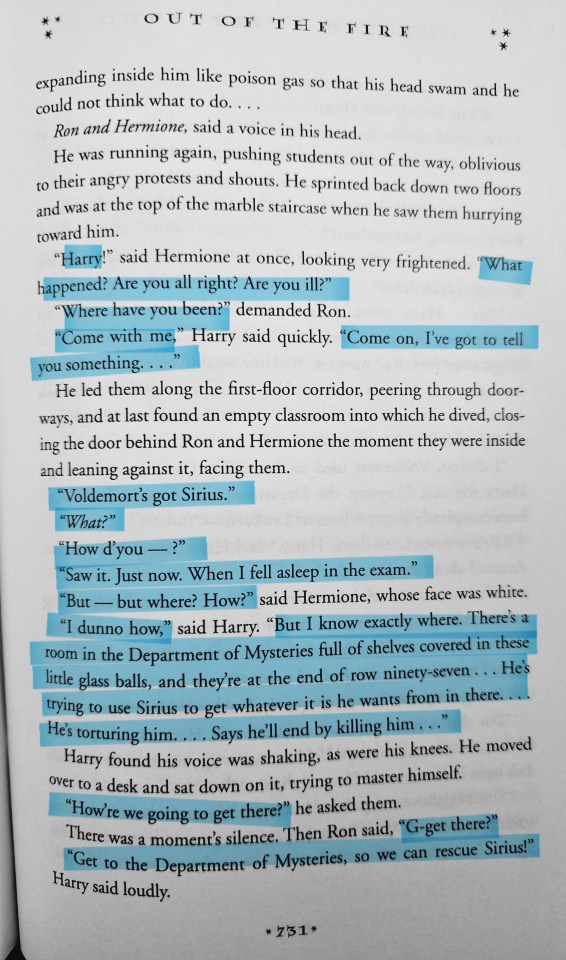
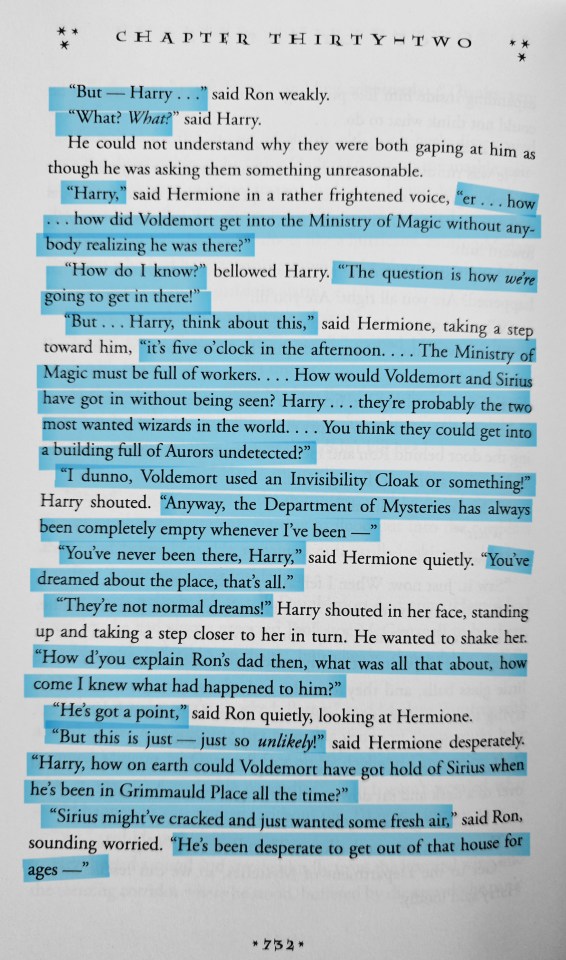
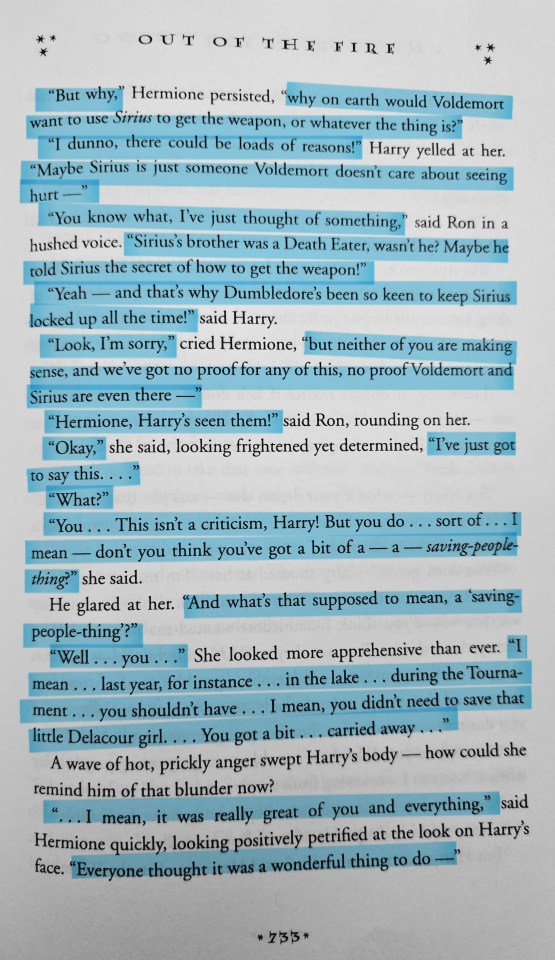
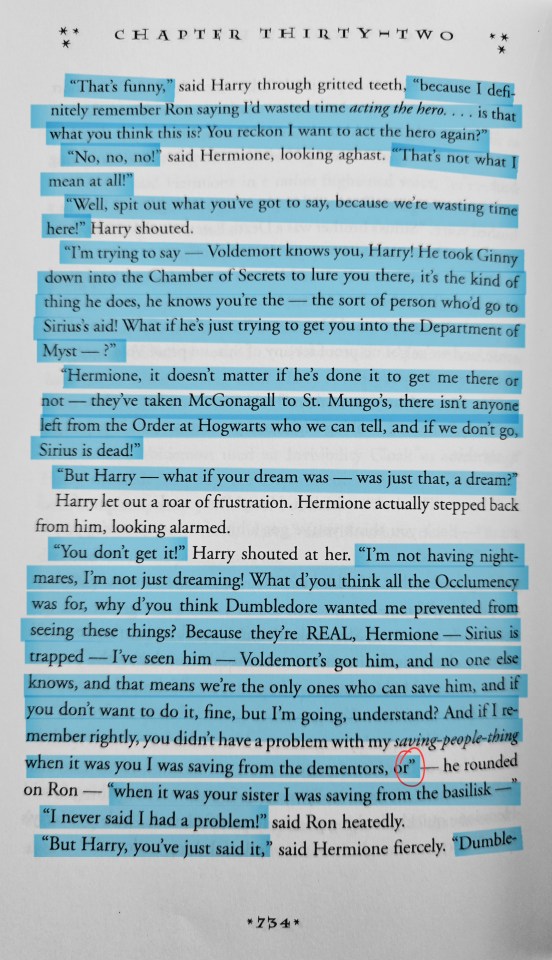
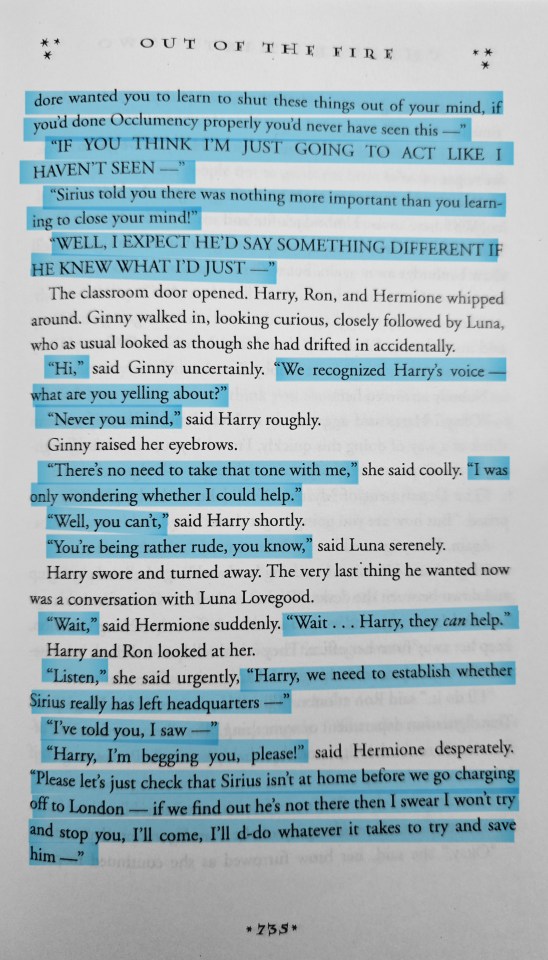
Since a certain anon lacked the skill to comprehend the difference between too much dialogue and stories driven by a high saturation of dialogue, let's go into further depth about dialogue.
What did I mean last week when I said: "Too much fucking dialogue!"
Today’s lesson will focus on the overall issue in JKR’s dialogue and in the prose surrounding those dialogue lines.
And since, apparently, I “lack the self awareness” to know most of my fics are “oversaturated with dialogue,” I’m going to use weaker examples of my own writing. Chapter 24 of TBG is heavily driven by dialogue with twenty-one named characters to juggle, something that's very difficult for me to manage. Though the chapter is lovely, I do feel it's some of my weaker work. In the end, I just didn’t have the energy to edit it a second time nor go through cutting edit.
Here are three different pages (some connected, some not) from Chapter 24 of Terrible, But Great. All dialogue is highlighted in blue.
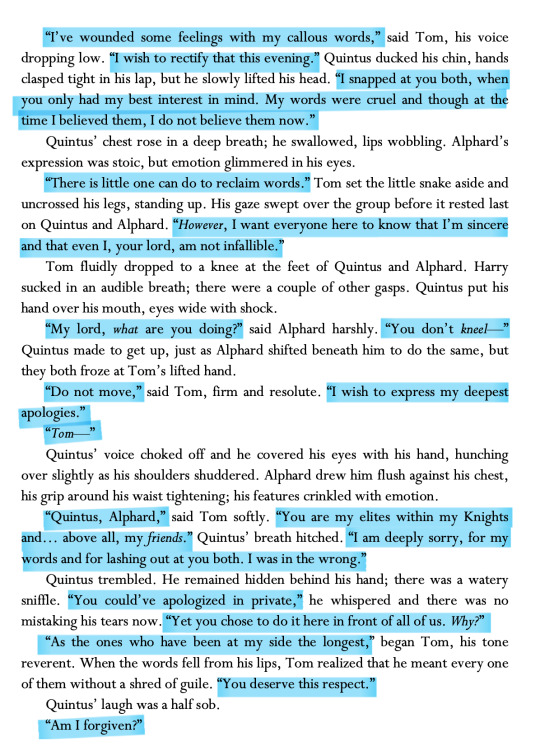
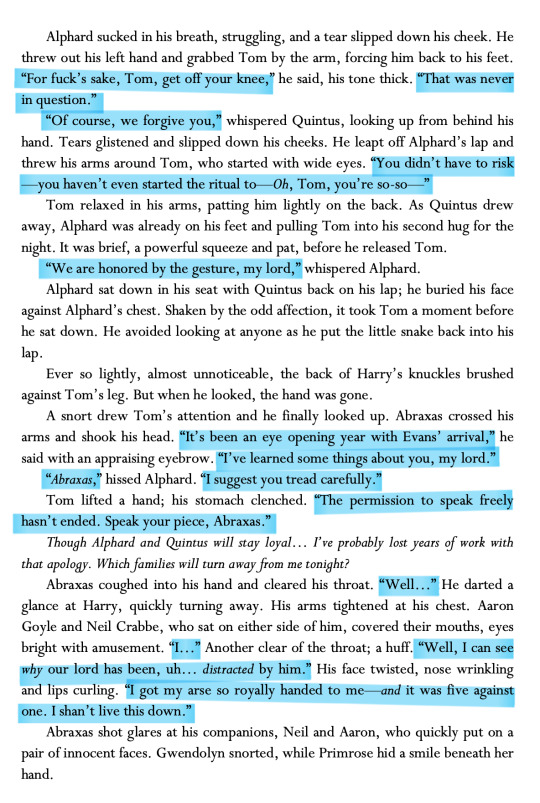
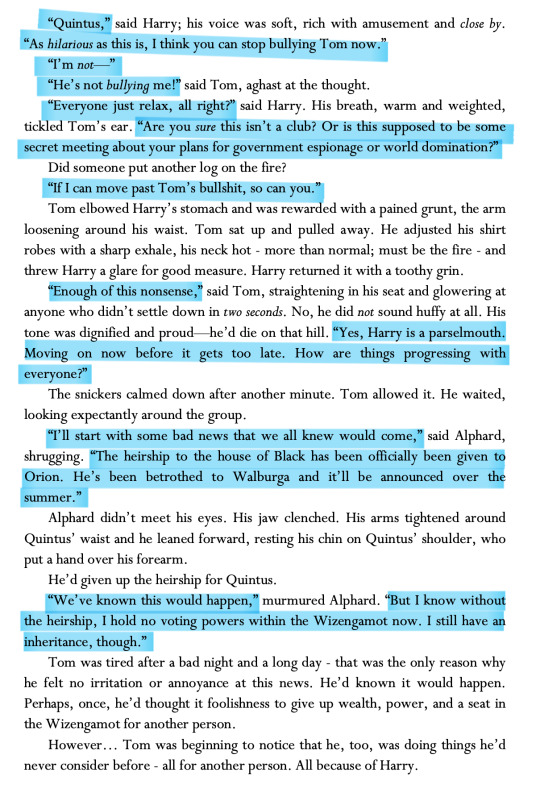
You can already see the difference, I'm sure.
So, what’s the difference between a scene that has 'too much fucking dialogue' versus a scene that is highly saturated with dialogue?
Because there is one.
Let's set the scene for HP5. In the middle of an OWL exam, Harry received a vision from Voldemort, showing him that Sirius has been captured. He's being tortured to get something from a shelf, but Sirius refuses. Harry believes the vision is real. He tells Ron and Hermione, then asks for their advice on how to rescue Sirius. Ron and Hermione are both like, pardon, wtf, sir? (As they should be.)
We have five pages of this fight between them. These five pages are mostly dialogue with very little else surrounding it.
Also, note the final page where it has the worst sins of adverb usage. That page is what triggered me to begin writing this series in the first place, btw.
There's too much dialogue here. There's no description. I'm being told stuff, but I'm not being shown anything. There are no emotional anchors to Harry either. The more I reread this scene, the more I realized what was wrong.
There’s an emotional disconnect from Harry in the prose.
Do not misunderstand me: it is NOT to say that Harry isn’t emotional here. It's that the prose doesn’t grip me, the reader, by the chest and twist my heart with his overwhelming emotions. The prose doesn't prove anything, doesn't show me anything. This is an intense, terrifying moment for Harry. It should feel visceral. It should feel tangible. I should be able to taste his fear.
We also don’t get too much information about the emotional states of Ron and Hermione. We have hints, of course. But we can’t feel them. The emotions of the scene are dampened, muffled, dull even.
With an untrained eye, you might disagree. It's okay. You'll see what I mean soon.
Page 731 exact quote:
"I dunno how," said Harry. "But I know exactly where. There's a room in the Department of Mysteries full of shelves covered in these little glass balls, and they're at the end of row ninety-seven...He's trying to use Sirius to get whatever it is he wants from in there....He's torturing him....Says he'll end by killing him..."
Harry found his voice shaking, as were his knees. He moved over to a desk and sat down on it, trying to master himself.
(Btw, punctuation issue: you do not use an ellipsis and a period together and there should be a space after the ellipsis.)
This is the only instance in the five pages where we get any information about Harry's physical state.
And it's written in such a weak 'telling' instead of 'showing' way, too.
How and where was his voice shaking? How are his knees shaking? Are they knocking together in a weird way that's kind of physically improbable? Or was it actually his legs were shaking? Isn't he leaning against the door? If his weight was resting against the door, then there'd be less shaking in his knees or legs because his knees would be locked to brace his body against the door. His arms and hands would be shaking, though.
How does Harry master himself? What does that look like? Slow breaths? Running a hand through his hair? Rubbing his face and eyes? How is Harry mastering himself? Is it mentally? Then, where are those mastering thoughts? What are they and why do those thoughts in particular help Harry 'master' himself?
What's Harry's tone as he talking about Voldemort threatening to kill Sirius? How is Harry feeling about this? Give me MORE!
The dialogue is presented to the reader in a bland, empty fashion. Harry is relating something to Ron and Hermione. I could switch the dialogue out with anything and it'd still make sense.
There is little surrounding the dialogue to anchor it.
So, let's rewrite this, shall we?
"I dunno how," said Harry, letting out a shaky breath. His hands clenched into fists against the door of the classroom. "But I know where—they're in a room in the Department of Mysteries that's filled with rows of shelves holding these... weird little glass balls. They're in row ninety-seven. Voldemort, he's—"
Harry's voice broke. His breath caught in his throat. The memory of the vision returned full force into his mind, the image of Sirius on the floor at Voldemort's feet stark in his mind. He ducked his chin; his chest inhaled in a desperate breath and the edges of his eyes burned.
He's torturing Sirius—I can't just wait around.
I can't lose him.
Harry looked up at Ron, whose face had grown pale, while Hermione stared at him with wide, terrified eyes. The strength in Harry's legs weakened.
"He needs Sirius to get whatever it is he wants and he's—" Harry sucked in a gasp, his voice trembling like an autumn leaf in a thunderstorm. "—he's torturing Sirius... says he'll kill him in the end."
His knees buckled. Harry stumbled to the nearest desk; Ron reached out with a steadying hand on Harry's upper arm and silent gratitude filled Harry's heart. With shaky arms, Harry lifted himself onto the desk to sit and twisted around to face Ron and Hermione. He licked his dry lips, rubbed his eyes with a hand, and took slow, deep breaths to master his fraying emotions.
The original canon text has 57 words of dialogue with a total of 83 words.
My rewritten version uses 56 words of dialogue with a total of 247 words.
I'm going to drill this concept into your heads, my lovely students: this is what I mean when I keep saying JKR's writing is both bloated and underwritten.
I only rewrote a single paragraph and its following line. The five pages I've provided are filled with this kind of empty dialogue.
So, what have I done here? Can you see the difference? Can you feel the difference?
Let's analyze what I focused on in this scene to show Harry's body language and his thoughts. I upped the physical effects on Harry's body. His fear causes his voice to break in the middle of explaining what's going on. He's terrified of losing Sirius, the only father figure he's ever known. Voldemort might take another parental figure from him.
And now the prose reflects these feelings, not just in his thoughts, but also in how he speaks and reacts to what is around him. He is not just speaking at the reader.
Harry exists in his world.
And you can feel it.
When he stumbles to the desk, Ron is there for him. Hermione reacting could also be added here. There is a lot that can be added to this scene, if one wanted to expand this further.
Yes, what I've done has increased the word count, yet it strengthens this short moment—and I'd do this for the entire scene.
What I did to the scene is merely one version of its potential. It could be rewritten in a multitude of ways and go in various directions. I spent 10mins to 20mins on it. I haven't edited it or refined it.
Can you finally see what I mean now?
If you compare the highlighted pages of HP5 to the highlighted pages of Chp 24 of TBG, you can visually see the difference in the density of the dialogue. JKR is the one whose writing is oversaturated with dialogue. My writing will always be highly saturated with dialogue because my stories are character driven. I prefer stories like that. But I also need the dialogue to be interesting and engaging, where the character feels alive in their world.
When I say there's too much dialogue, this scene is such a good example of this because Harry, Ron, and Hermione are all over the place in their interactions with each other. Yes, you want your characters to sound realistic, but you're also the author curating an experience for the reader.
There's a balancing tightrope act between having realistic dialogue and unnecessary dialogue.
There's a thin line between showing too much and telling too little.
Lastly, if I were to improve the overall scene, I would center the focus on Harry's desperation to rescue Sirius. As Ron and Hermione try to talk him out of it, where Hermione delivers that iconic line of 'you have a people saving thing,' I'd have Harry explode with something like this:
"You don't know what's it like! You both have your parents—I-I don't... You'd feel the same as me if it were either of your parents being tortured by Voldemort, yeah? I can't lose him—I can't lose Sirius."
I'm not bothering with description around it right now. I just wanted to give the baseline dialogue to show you the theme I'd carry through this scene. It's all about Sirius. It's all about the fear of losing him. It's about showing the emotion of the character and making the reader feel that deeply.
And that's what matters the most.
All right then.
We have come to an end of Part Two in this series. We have discussed fives pages in JKR's Harry Potter and the Order of the Phoenix. The pages in question are 731 - 735 should you wish to look it up and study the scene yourself.
And so, please do the world the greatest of favors and write better than J.K. Rowling. I promise, it's not that hard once you see the differences.
Until next time.
Isa
#harry potter#hp#fanfiction#fanfic#hp fanfic#hp fanfiction#harry potter discourse#harry potter books#jk rowling#fuck jkr#anti jkr#jk rowling is a terrible writer series by isalise#on writing#writing#writers#writer#author#authors#writing advice#writing stuff#becoming better at writing#writer stuff#writeblr#writers on tumblr#writers on ao3#writerscommunity#creative writing#JKR's Terrible Amateur Writing Series#writing help#writing resources
158 notes
·
View notes
Text
Oho, my, my... It would appear that I've upset some people tonight. Oho, how delightful.
Truth tends to do that, I've found.
My intent with my new JKR's writing analysis series is to help others improve their writing. Nothing more, nothing less. It's not a series where I'm trying to bitch about anything. I'm just obsessed with writing. I love helping other writers become better and stronger.
I don't actually care about JKR.
We can always dissect other authors after I'm through with her.
As a teenager decades ago, I used to idolize her and her writing. However, I learned that when I copied her, it weakened my writing. I quickly outgrew her.
I wish to prevent this mistake for others. My desire is to help young aspiring writers to critically analyze JKR's writing (and potentially other authors) without putting this woman on a pedestal.
After all, we don't need the canon texts anymore. Fanfiction writers as a whole have so greatly surpassed her on a glorious scale. The writing skills of fanfiction writers far exceed JKR. If this idea and concept triggers you and makes you angry, then you might want to take a step back and self reflect on that personal issue.
And if you still have a problem, then this writing series is obviously not for you.
That's okay.
If I'm the only brave person around here to dissect J.K. Rowling's writing and reveal its true nature, then so be it.
Class is in session. See yall next week for Part Two.
#writing advice#JKR's Terrible Amateur Writing Series#jk rowling is a terrible writer series by isalise
49 notes
·
View notes
Note
I am trying to understand the issues with the prose from the HP books. Would you be willing to give me a few examples and explain them to me?
cracks knuckles
Sorry it took me so long, but you asked and I have delivered~!
A Deep Dive into JKR's Terrible, Amateur Writing - Part One
#god bless anons#anon ask#writing advice#JKR's Terrible Amateur Writing Series#jk rowling is a terrible writer series by isalise
11 notes
·
View notes
Note
Thank you so much for your first post tearing apart She Who Must Not Be Named 's writing, I'm noticing the flaws easier now. I can't wait for the next installment 😊
Well, that's definitely not the intent, but I do hope that writers can learn from this series. ❤️🧡💛💚💙💜 There's so much we can learn from JKR's writing.
#god bless anons#anon ask#jk rowling is a terrible writer series by isalise#JKR's Terrible Amatuer Writing Series
9 notes
·
View notes
Note
What kinds of authors do you reccomend pulling inspiration from instead?
Oh, boy. I feel quite inadequate to answer this question. I'll do my best, though.
So, I have read many of the classics in my youth. I was homeschooled for the entirety of my childhood and my mother fostered my learning by picking highly dense literature electives for me in high school. I was exposed to many of the old classics, like Great Expectations and Wuthering Heights.
While I was at a dance class, my mother would often get books from the library that also had their tapes available. (Yup, cassette tapes, not CDs.) At around age 10 to 12, my mother brought home Harry Potter and the Sorcerer's Stone in book and cassette tape format. From there, I would read along as I listened to Jim Dale's voice draw me into a world that I'd never truly leave.
Harry Potter would not be the only books I'd read like this. I was exposed to many authors. So many, I can't remember most of them.
I think to fully answer your question, Anon, you should pull inspiration and learning from ALL writers. Yes, even JKR. If you only learned from "master" writers (and I don't think any writer is, myself included), how will you learn to recognize your own weaknesses in your writing?
When I first discovered fanfiction, I devoured tons of stories. I read everything. I wasn't picky. I read poorly written stories and well written stories. Within a short amount of time of only reading, my writing style drastically shifted into the beginnings of what it would be today. I improved immensely. Even now, it's constantly evolving. I look back on TBG chapters I posted from last year and see prose I'd fix or alter.
Read from everyone. Read the novels that are considered "trashy" on BookTok. Read the poorly written books. Read the stunning written books. Read the books with good writing, but terrible plot/characters. Read the books with poor writing, but beautiful plot/characters. Read the popular books. Read the obscure books. Read different genres, if you can handle it. Read all the books. Read fanfiction, too. The more exposure you have to all kinds of writers, the better a writer you will become. This isn't a new concept, either. I'm simply parroting what Steven King has said before.
When you're able to see the strengths and weaknesses of other writers and learn how to evolve your own writing style from your studies, you will grow faster than you realize. No writer is perfect. I'm not perfect. It's taken me two decades to lift my chin and have the confidence to say, "I'm a damn good writer," but I'm not perfect. I know where my strengths are and I know where my weaknesses are, but I am constantly reading and studying to improve my writing. I am always actively working on my craft.
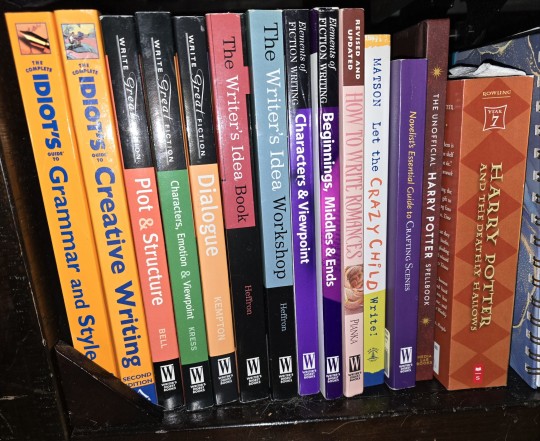
Most of these writing help books are 2 decades old. I've read them all multiple times throughout my life. This is only a third of what I own on the topic of writing, too. I highly recommend all of these books, especially Beginnings, Middles & Ends.
In my series about analyzing JKR's writing, my goal is to help writers learn to see the strengths and weaknesses in someone else's writing. This skill will carry over to other authors and to your own writing. The reality is you do not have to be a marvelously skilled writer to make it big in the publishing world. Many traditionally published books prove this.
That's not really my purpose here. I simply have a passionate love for the craft of writing and storytelling. This is one way that I can share that with others.
#god bless anons#anon ask#jk rowling is a terrible writer series by isalise#JKR's Terrible Amatuer Writing Series
1 note
·
View note